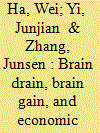| Srl | Item |
| 1 |
ID:
147441


|
|
|
|
|
| Summary/Abstract |
We have used Chinese provincial data (1980–2005) to examine the effects of permanent and temporary emigration on human capital formation and economic growth in source regions. First, we find that permanent emigration is conducive to the improvement of both middle and high school enrollment. In contrast, while temporary emigration has a significantly positive effect on middle school enrollment it does not affect high school enrollment. Moreover, the different educational attainments of temporary emigrants have different effects on school enrollment. Specifically, the proportion of temporary emigrants with high school education positively affects middle school enrollment, while the proportion of temporary emigrants with middle school education negatively affects high school enrollment. Finally, we find that both permanent and temporary emigration has a detrimental effect on the economic growth of source regions.
|
|
|
|
|
|
|
|
|
|
|
|
|
|
|
|
| 2 |
ID:
103916


|
|
|
|
|
| Publication |
2011.
|
| Summary/Abstract |
This paper analyzes gender earnings gaps in Hong Kong using the 2006 by-census data. To explore the sources of gender earnings gaps, we decompose the gaps using the method proposed by Machado and Mata (2005). We have three major findings. First, gender earnings gaps are larger both in lower positions and in higher positions in the earnings distribution. Both the "glass ceiling effect" and the "sticky floor effect" exist in Hong Kong. Second, gender earnings gaps in higher positions are much explained by gender differentials in productivity-related characteristics; however, gender earnings gaps in lower positions are barely explained by these characteristics. Third, the effect of occupational segregation on gender earnings gaps depends on specific positions in the earnings distribution. In lower positions, occupational segregation is not a big problem and has little impact on gender earnings gaps; in higher positions, however, occupational segregation favors male workers and enlarges gender earnings gaps.
|
|
|
|
|
|
|
|
|
|
|
|
|
|
|
|